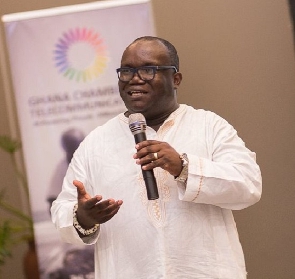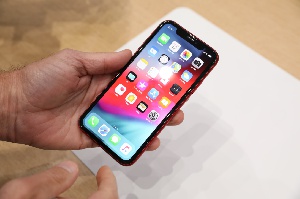 Ken Ashigbey, Chief Executive Officer of the Telecommunications Chamber
Ken Ashigbey, Chief Executive Officer of the Telecommunications Chamber
The total tax contribution by mobile network operators as well as other technology companies belonging to the Ghana Chamber of Telecoms reached GH¢3.2bn in 2019, representing a 207 percent increase over the figure recorded in 2013.
Chief Executive Officer of the Chamber, Ing. Ken Ashigbey, explained that the contribution which represents nearly a tenth of all government revenues collected in 2019, came on the back of a troubling business environment for its members.
“The collection of the taxes has an indirect cost to our members as it makes the product and service relatively more expensive,” he said.
The total tax contribution study carried out by the mobile industry association highlights mobile network operators and infrastructure companies’ contribution measured in taxes and other remittances to the government in the year under review.
The Telecoms Chamber CEO noted that, in spite of the heavy tax burden, the telecoms industry continues to commit investible funds into capital expenditure to meet customer service quality and experience needs.
“Capital expenditure investment has increased exponentially in the fiscal year, however, there is the need for policy to support and enable even more investment by all players into the ecosystem to meet customer demand for mobile services.
The mobile industry believes that policy enablers such as tax reforms, tax rebates in relation to the import of infrastructure and equipment could improve the affordability of mobile technology and services for customers yielding greater strides for all stakeholders in the long-term,” said Ing. Ashigbey said.
The study further noted that: “appropriate spectrum management framework [by the industry regulator] will provide needed clarity for more funding into existing and new technologies such as 4G and 5G, which requires further policy direction and support to grow.”
Ing. Ashigbey further argued that mobile is the most cost-effective way of extending access to ICT, the internet in Ghana as well as driving the government’s digitisation agenda.
“It is therefore fundamental to helping our government achieve its objectives of expanding the ICT infrastructure, meeting last-mile goals, connecting the unconnected and positioning our economy as a smart and digital-ready market towards further growth,” he added.
- Local content legislation for telcos sector underway – Ursula Owusu-Ekuful
- Deployment of AI likely to impact 40% of global workforce – IMF predicts
- Why 21% VAT on Facebook and Instagram advertising in Ghana is 'evil'
- Elon Musk's Starlink slashes internet router price by 45% in Nigeria
- Global IT spending to increase by 8% in 2024 – S&P
- Read all related articles










